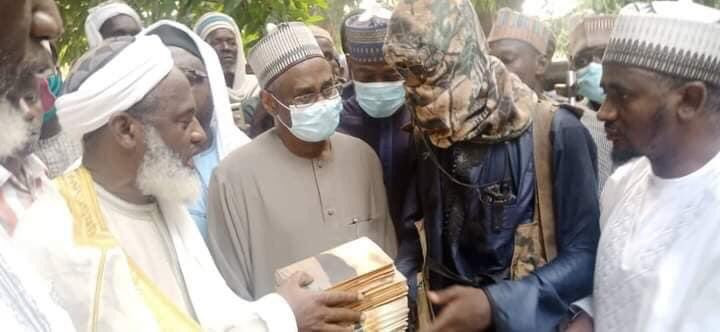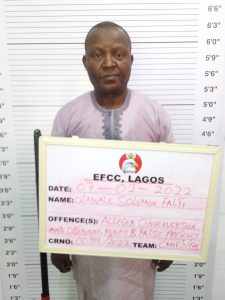
A prominent Muslim cleric acting as a self-appointed middleman has emerged as a divisive figure in the kidnap-for-ransom crisis plaguing northern Nigeria, which has seen more than 800 students seized in recent months.
Sheikh Ahmad Gumi, a former army captain, was involved in Wednesday’s release of 27 students abducted in March from a forestry college in Nigeria’s Kaduna state.
Such is his influence that the parents of the freed students paid him a “thank you” visit where he assured that 16 other students abducted from Greenfield University in Kaduna state in April, would not be killed.
Their abductors, who had previously killed five of them and released one after a ransom was paid, had threatened to kill the remaining hostages if no ransom was paid at the expiration of a Wednesday deadline but the sheikh said he had talked them out of it.
Gumi first emerged on the scene in February after he went on a so-called peace mission to a group of bandits in their forest hideout in Zamfara state.
Since then, he has undertaken other such visits to Katsina, Kaduna and Niger states, urging bandits to stop carrying out attacks.
But despite his mediatory role, he has stirred controversy for advocating talks and a “blanket amnesty” for the criminal groups responsible for the recent wave of kidnapping in northern Nigeria.
“If the country could pardon coup plotters who committed treasonable offences in the era of military administration, the bandits can as well enjoy similar forgiveness even better under democratic rule,” he said.
On another occasion, he said: “Kidnapping children from school is a lesser evil because in the end, you can negotiate and now bandits are very careful about human lives. Before, the mission of bandits was to go into a town, ransack it and kill people.”
Such views about the bandits, who have abducted hundreds of civilians, including schoolchildren and other students – and killed some in the process – are seen by many as showing that his sympathies lie with the criminals, fuelling anger and division along religious, regional and ethnic lines.
In February, a viral online video showed Gumi making remarks alleging that non-Muslim Nigerian soldiers were responsible for insecurity.
He was censured by the influential Christian Association of Nigeria (CAN) for aggravating long-running religious and ethnic tensions, while the army said he “deliberately wanted to disparage the Nigerian Army to portray it in bad light.”
Gumi said his comments had been misunderstood and his actual message was manipulated.
Gumi’s mediation efforts have also made him a target for Islamist militant group Boko Haram, whose leader Abubakar Shekau issued messages threatening the cleric.
He has also been critical of President Muhammadu Buhari’s perceived mismanagement of the security crisis, which in turn provoked a backlash from the authorities, politicians from the ruling All Progressives Congress (APC), and religious groups.
The sheikh has often downplayed having any political associations. However, in 2019 he was branded a member of the opposition People’s Democratic Party (PDP) when a photo of him with PDP’s then presidential candidate Atiku Abubakar surfaced.
Sheikh Ahmad Gumi – key facts:
Born in 1960 in Kano state
Eldest son of the late Sheikh Abubakar Mahmud Gumi, an outspoken Islamic scholar and Grand Khadi (chief judge of the Shariah Court of Appeal) in northern Nigeria.
Studied medicine before enlisting with the Nigeria Defence Academy and serving as a medical officer in the Nigerian Army Medical Corps (NAMC)
Attained the rank of captain before retiring from military service and moving to Saudi Arabia to study in Mecca, where he obtained a Doctor of Philosophy in Usul ul Fiqh (principles of Islamic jurisprudence)
Currently the Mufti and Mufassir (scholar and writer) at the Sultan Bello Mosque in Kaduna Married with several children
Since the beginning of the year, Sheikh Gumi has met several bandit leaders to “dissuade them from their militancy”.
In February he met the leader of a bandit group that kidnapped 42 people, including students, in Niger state. The hostages were released shortly after.
Following the abduction of about 20 students from Greenfield University in Kaduna state in April, Gumi reportedly urged the Central Bank of Nigeria to pay the group responsible their ransom demand of $260,000 (£190,000) and 10 Honda motorcycles. The payment has not been made and the students remain in captivity.
Authorities say Nigeria’s kidnap crisis is being fuelled by such ransom payments and both President Buhari and Governor Nasir El-Rufai of Kaduna state are against it. Instead, they want bandits arrested and prosecuted.
Gumi has defended himself, saying that: “I am not the first person that started dialoguing with them [bandits]. I only added value… I never visited these bandits without a government official present.”
In a February interview with TV station AIT, he suggested that the bandits had picked up kidnapping from oil militants in Nigeria’s Niger Delta region.
“They learnt kidnapping from Mend [a Niger Delta militant group]. I do not see any difference. They were the first victims of rustling, their cattle is their oil,” he said.
In 2009 thousands of Niger Delta militants who surrendered their arms were granted an unconditional amnesty by the government of President Umaru Yar’Adua after years of wrecking havoc on oil installations, abductions and killings in the region.
Some people in southern Nigeria have dismissed such comparisons, arguing that the Niger Delta militants had a political cause – greater control of their region’s oil wealth – while the bandits are only after money.
Others claimed that politicians, activists, security personnel, religious and community leaders who acted as mediators in the Niger Delta militancy profited from it, so they are weary of Gumi’s self-appointed role and the economy being built around the kidnap-for ransom crisis.
But whatever his critics say, the sheikh’s influence is growing. One indication of this is that in the continuously changing nomenclature for what is happening in northern Nigeria, the armed groups are now being referred to by some as militants, rather than bandits.
source: bbc.com



